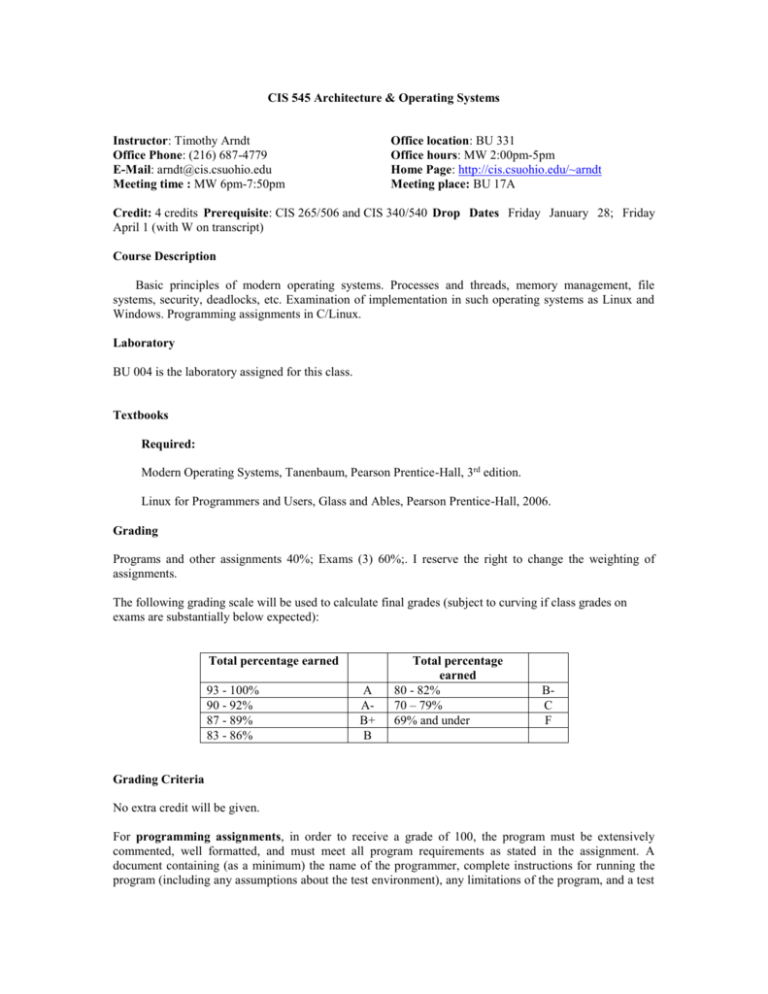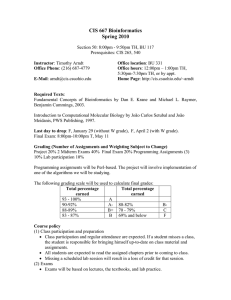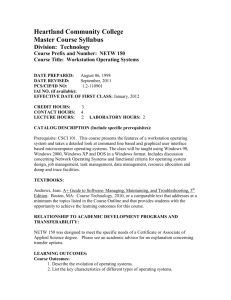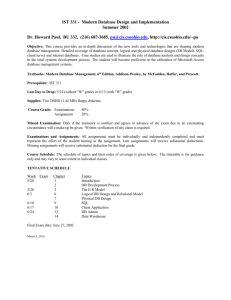
CIS 545 Architecture & Operating Systems
Office location: BU 331
Office hours: MW 2:00pm-5pm
Home Page: http://cis.csuohio.edu/~arndt
Meeting place: BU 17A
Instructor: Timothy Arndt
Office Phone: (216) 687-4779
E-Mail: arndt@cis.csuohio.edu
Meeting time : MW 6pm-7:50pm
Credit: 4 credits Prerequisite: CIS 265/506 and CIS 340/540 Drop Dates Friday January 28; Friday
April 1 (with W on transcript)
Course Description
Basic principles of modern operating systems. Processes and threads, memory management, file
systems, security, deadlocks, etc. Examination of implementation in such operating systems as Linux and
Windows. Programming assignments in C/Linux.
Laboratory
BU 004 is the laboratory assigned for this class.
Textbooks
Required:
Modern Operating Systems, Tanenbaum, Pearson Prentice-Hall, 3rd edition.
Linux for Programmers and Users, Glass and Ables, Pearson Prentice-Hall, 2006.
Grading
Programs and other assignments 40%; Exams (3) 60%;. I reserve the right to change the weighting of
assignments.
The following grading scale will be used to calculate final grades (subject to curving if class grades on
exams are substantially below expected):
Total percentage earned
93 - 100%
90 - 92%
87 - 89%
83 - 86%
A
AB+
B
Total percentage
earned
80 - 82%
70 – 79%
69% and under
BC
F
Grading Criteria
No extra credit will be given.
For programming assignments, in order to receive a grade of 100, the program must be extensively
commented, well formatted, and must meet all program requirements as stated in the assignment. A
document containing (as a minimum) the name of the programmer, complete instructions for running the
program (including any assumptions about the test environment), any limitations of the program, and a test
procedure. This document must be formatted as text (not Word) unless explicit permission is given. Any
test data needed for testing (e.g. media files) must be provided as well.
Deductions will be made for violations of any of the above criteria.
A program that does not run at all will not receive a grade above 70.
A program that always fails to produce correct results will not receive a grade above 80.
Programs that work on some (but not all) test cases (both those provided by the student and those provided
by the instructor) will have a maximum grade of between 81 and 95, depending on the number of cases in
which the program produces incorrect results.
For exams, problems will be multiple choice/true false/short answer as well as problem solving and
descriptive problems. For problem solving type questions, mistakes in arithmetic will result in only small
deductions while failure to use the correct technique will result in a larger deduction. Any assumptions that
you make in answering these types of questions should be written as part of the answer to the question. A
small deduction will be made if your answer is very hard to read, so be neat. Illegible answers will receive
no credit. For descriptive type questions, if you describe some other entity rather than one asked for, you
will receive no credit.
Course policy
(1) Class participation and preparation
Class participation and regular attendance are expected. If a student misses a class, the student is
responsible for bringing herself/himself up-to-date on class material and assignments.
All students are expected to read the assigned chapters prior to coming to class.
All cell phones and pagers must be turned off during class.
Notebook computers may be used only for taking notes and for no other purpose. Abuse of this
privilege will cause all students to lose the privilege.
Chatting is not allowed during class periods. If you have a question about material being presented
in class, please ask the instructor.
(2) Exams
Exams will be based on the combination of: material covered in lectures, the assigned reading from
the textbooks, material covered in the notes, and lab practice.
All exams are closed books and closed notes.
No makeup exams will be given!
(3) Homework assignments
All homework assignments are due at the beginning of class on the specified date. An assignment
turned in one day late will get a 10% penalty, two days late will get a 20% penalty, etc. Assignments
turned in after the beginning of class on the due date will be counted as one day late and will receive
a 10% penalty.
All assignments must be individually and independently completed. Should two or more students
turn in substantially the same solution or program, in the judgment of the instructor, the solution
will be considered a group effort. All involved in a group effort homework will receive a zero grade
for that assignment.
No late assignment will be accepted after the assignment is graded and returned.
See the CSU student conduct code for further information.
(5) Class cancellation:
If I need to cancel class for any reason, I will try to put an announcement on the course web page as
early as possible.
(6) Grading mistakes
All grading mistakes must be corrected within one week of the return of the assignment or quiz. No
exceptions.
It is your responsibility to verify that your exams/assignments have been graded correctly.
Week
Week 1
Week 2
Week 3
Week 4
Week 5
Week 6
Week 7
Week 8
Week 9
Week
10
Week
11
Week
12
Week
13
Week
14
Week
15
Tentative Course Schedule
Topics covered
Reading (Tanenbaum 3rd edition)
Course introduction; Introduction to Lab; Linux Chapter 1
review.
Linux review. Monday September 1, Labor Day,
no class.
Processes and threads.
Chapter 2
Memory management.
Chapter 3
File systems
Chapter 4
Exam 1. Input/Output
Chapter 5
Deadlocks
Chapter 6
Multimedia Operating Systems. Monday October Chapter 7
13, Columbus Day, no class.
Multiple Processor Systems.
Chapter 8
Security
Chapter 9
Security (ctd.) Exam #2
Case study: Linux
Chapter 10
Case study: Windows
Chapter 11
Case study: Symbian OS
Chapter 12
Operating System Design
Chapter 13
Final Exam Wednesday May 11, 6pm-8pm
Student Conduct:
Students are expected to do their own work. Academic misconduct, student misconduct,
cheating and plagiarism will not be tolerated. Violations will be subject to disciplinary
action as specified in the CSU Student Conduct Code. A copy can be obtained on the web
page at:
http://www.csuohio.edu/student-life/student_handbook/index.html or by contacting
Valerie Hinton Hannah, Judicial Affairs Officer in the Department of Student Life.







